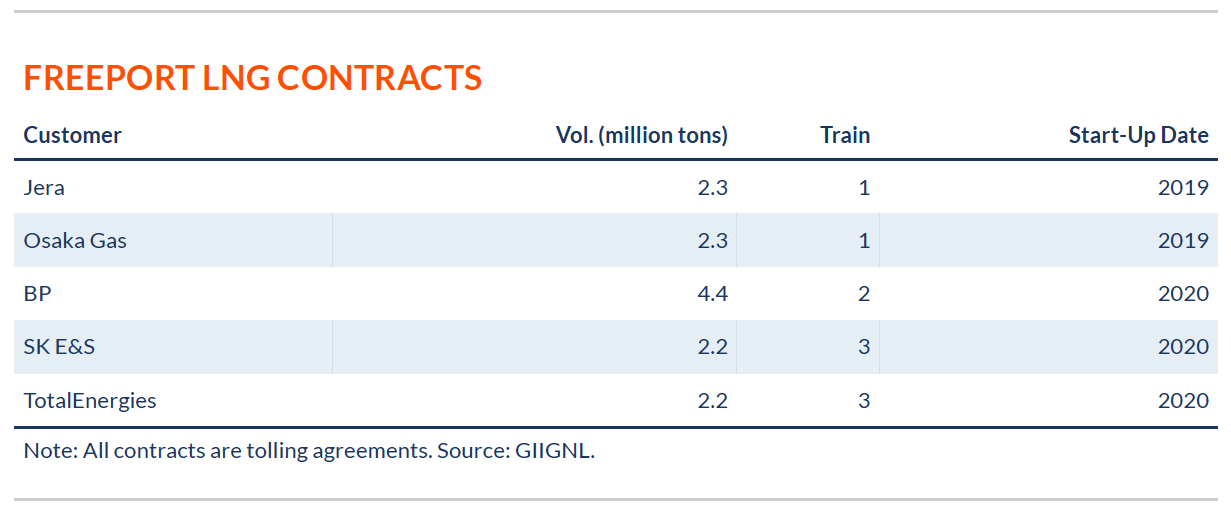Read on Energy Intelligence
“While a restart of the facility by early October is not out of the question,” said consultancy ArboIQ in a customer note from Aug. 5, “the timelines set forth in the consent order lead us to believe a restart of initial operations to the extent indicated is a very aggressive timeline. A more reasonable timeline would put such a restart at the end of this year or the beginning of next.”
Freeport LNG reportedly retracted a force majeure (FM) declaration issued in the aftermath of a Jun.8 explosion that took the 15 million ton per year liquefaction plant offline.
The company declared FM on Jun. 9 and then retracted it on Jun. 30, according to media reports that cited the relevant documents.
Force majeure is a provision in a contract that frees both parties from obligation if an extraordinary event directly prevents one or both parties from performing. Retracting it could cause a significant hit to Freeport's customers, although the actual impact was unclear at press time.
A legal source tells Energy Intelligence that the move to declare force majeure, then retract it, is"extremely rare" but not legally problematic and likely the most prudent path for the company.
Some contracts require a party to give notice of force majeure right away, as part of an obligation tonotify the affected parties. However, the source said Freeport LNG may have realized that forcemajeure "wouldn't apply, wouldn't prevail, so they backed off" — and there is no legal requirement that would prevent it from reversing course.
In the early stages of an event "you don't know what caused it," which might lead a company to begin with a force majeure until the details become clear.
Freeport has not commented publicly about the alleged retraction.
Domino Effect
But Freeport's actions are not without complications. The plant's LNG offtakers have force majeure provisions with their own buyers, giving Freeport's decision "such a broad impact in the market," the source said.
If Freeport declares force majeure, its offtakers don’t have to supply their customers. But withFreeport retracting, its offtakers may have to supply their customers in turn with alternative, and potentially very expensive, LNG cargoes from the short-term market.
The legal source expects a flurry of lawsuits, although "some may reach agreement" and settle.

Freeport’s Timeline
Freeport, on the Texas Gulf Coast, represented about 18% of US LNG capacity when it suffered an explosion on the morning of Jun. 8.
The incident caused a spike in a worldwide LNG market that has become heavily dependent on USLNG exports, especially for Europe, in the wake of the Russian invasion of Ukraine.
An initial estimate of a three-week outage, several days later turned into a 90-day outage with full operations not expected until end-2022. A recent consent agreement with the federal government signaled an October restart, but some analysts are not so sure.
“While a restart of the facility by early October is not out of the question,” said consultancy ArboIQ in a note from Aug. 5, “the timelines set forth in the consent order lead us to believe a restart of initial operations to the extent indicated is a very aggressive timeline. A more reasonable timeline would put such a restart at the end of this year or the beginning of next.”
ArboIQ mapped out the various requirements by the US Pipeline and Hazardous Materials SafetyAdministration (PHMSA) requirements and timeline.
“Assuming PHMSA takes thirty days to approve the [restart] plan and Freeport takes 30 days to implement the plan needed to restart three liquefaction trains, two LNG storage tanks and one LNG loading dock, that initial restart would not occur until Jan. 30, 2023, far later than early October,” it said in a note.
A History of Force Majeure
More typical declarations of force majeure have occurred in recent years in connection with Covid-19, a hurricane and a jihadist assault.
For example, BP declared force majeure in April 2020 on its Greater Tortue floating LNG project. The force majeure was said to be due to Covid-19 delays for the project, which led to a need to delay the arrival of Golar’s FLNG vessel.
Then in September 2020, Cameron LNG declared force majeure on deliveries in the wake of Hurricane Laura. And TotalEnergies declared one on Mozambique LNG after a jihadist assault.